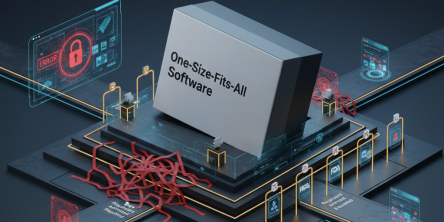Future Trends to Watch Out for in E-commerce Application

Each year brings innovations, adaptations, and strategies to every sector, and e-commerce is no different. However, to keep up with the growing market, eCommerce businesses will need to rethink their strategies in 2023 as consumers' behavior, and expectations change.
As a result, global e-commerce sales have reached more than $5.5 trillion in the past few years.
As more and more shoppers gain access to the market every year, new trends are being imposed upon marketing and sales teams. In 2023, social commerce, mobile commerce, a sustainable way of doing business, and digital experiences will be the year's buzzwords!
You may still need to be convinced about the future of eCommerce Applications. Still, these latest trends will convince you that it is growing slowly and will remain a viable business model for years. As a result, you can incorporate this eCommerce development into the operation of your online store to ensure steady growth.
Continue reading the article to ensure you take advantage of these emerging trends and expand your e-commerce business in 2023.
Increasing sales through eCommerce technologies
As new eCommerce technologies emerge, we can see a direct correlation between the rise of online retail and the emergence of the online age. The convenience of shopping online has increased to an unprecedented level. There is no surprise, then, if the eCommerce market is predicted to grow by almost $13 trillion between 2022 and 2027.
A look at the key technologies that will shape the eCommerce industry in 2023
E-commerce app development services have a bright future. Still, you need a path to get there. By presenting the latest eCommerce trends for 2023, we help you get started on your journey to success.
Social Commerce
A social network is more than a communication tool. In addition, opening new business opportunities will also help boost your brand's awareness, provide excellent customer service, and encourage your clients to make purchases.
As a result, social commerce is a way for people to sell goods directly to each other on social networks. This online retail option offers a complete buying experience, from finding out what products are available to make the payment.
More than 100 million American consumers regularly make purchases through social media, and Facebook is the most popular among them.
Buy Now, Pay Later (BNPL)
The buy now, pay later trend is one of the hottest e-commerce app development trends. This method allows customers to pay interest-free installments over the contract's life.
During the Pandemic, such a service became especially popular because people sought alternative funding sources and needed the flexibility to face the challenges.
It was preferred by customers to refrain from using their credit cards when shopping, so this meant that BNPL was the ideal option for them.
The emergence of hybrid platforms
It is no secret that content and commerce platforms have undergone a quiet revolution over the last few years. With API-first platforms, customers can drive their digital transformation across the globe with a new level of flexibility and connectivity.
A new approach to payment options
Payment options are among the main factors influencing a customer's selection of a particular brand. You will not be able to convert your customers into buyers if you do not accept their preferred payment methods.
Presently, most eCommerce businesses accept digital wallets and debit or credit cards. A major advantage of cryptocurrency is its lack of reverse transaction fees and low transaction fees for online shop owners.
Business-to-business transactions
The future of e-commerce includes an increase in business-to-business transactions. The Business-to-Business (B2B) transaction is the exchange of services and products between two or more businesses.
With the advent of digital and mobile technologies, businesses are increasingly turning to eCommerce to simplify and streamline their B2B transactions.
Investing in the right technologies and implementing the necessary processes and protocols as a part of the transition to digital B2B eCommerce is one-way companies can prepare for the change.
A study by Accenture predicts that by 2025, an estimated 80% of all B2B sales transactions will be conducted online, with most of the transactions taking place via digital channels.
When you hire an eCommerce app developer, they will help you develop a platform and give you an edge over your competitors.
Taking center stage is voice shopping.
There is no doubt that voice shopping is becoming one of the mainstream online shopping methods for next-generation shoppers. By 2022, researchers predict voice-driven searches will account for more than half of all searches.
Many big players have already implemented voice shopping in their online grocery stores, including Amazon, Alibaba, and Walmart. With Amazon's launch of the Echo smart speaker in 2014, this eCommerce trend gained popularity.
Approximately 30% of US internet users have used voice assistants to search for product information or purchase products. Voice commerce is spontaneously being integrated into online retailers' businesses. Therefore, buyers can use their voices to make purchases.
Augmented Reality to Visualize Purchases
Online shopping makes modern life easier because everything is delivered to your door. You can purchase without wasting time in traffic with just a few clicks. As well as that, you can browse a lot of products and compare their prices and quality without wasting time. A quick delivery service has made eCommerce shopping a more pleasant experience than ever before.
While online shopping has so many benefits, there is also a significant downside to it. A detailed view of a product is only possible sometimes, and consumers sometimes need to make better predictions about products and end up dissatisfied. Despite this, augmented and virtual reality can bridge the gap. It gives you a 360-degree view of any product or place you wish to view. You can then easily see how you can use it in your daily life to achieve the results you desire.
Conclusion
To achieve market dominance, e-commerce businesses must adopt the latest trends early. Among the trends expected in 2021 are voice commerce, omnichannel shopping, artificial intelligence, and augmented reality. As online businesses become more attractive to customers, they will accept crypto payments.
Similar Articles
Not long ago, the idea of multiple AI agents working together, each with a specific role, collaborating to solve problems, felt like science fiction.
In today’s data-driven world, choosing the right business intelligence (BI) platform can make or break your organization's analytics success.
We all know that companies today are no longer limited to a single physical location. Work processes are also no longer strictly isolated.
It is neither secret nor news that the mind-boggling pace of digital transformation around us has totally altered consumer expectations.
In the world of finance, speed and accuracy are everything. Decisions made a day late can cost millions, and delayed visibility into financial performance can leave even the best organizations blind to risks.
Discover the best tools to enhance employee recognition, boost morale, and create a more motivated, engaged workplace culture.
At first glance, off-the-shelf software appears to be a dream come true. They are quick to set up, cheaper upfront, and marketed as “universal.”
A modern business must continually adapt. This bit everyone seems to know.
The modern healthcare industry is undergoing a significant transformation. The models of healthcare that we are used to thus far are now making way for a more data driven approach









